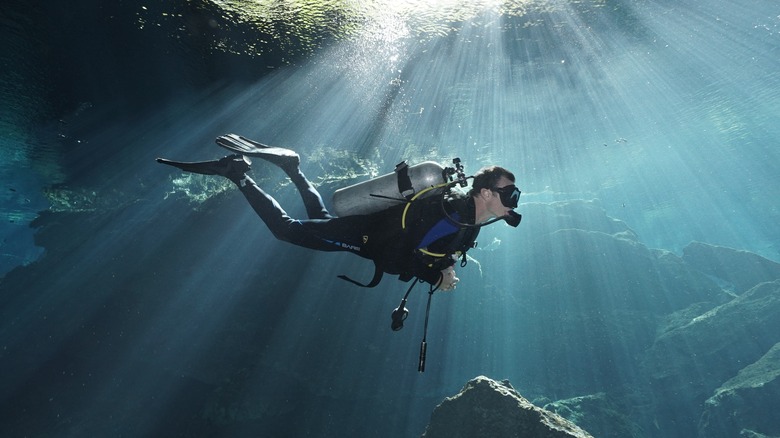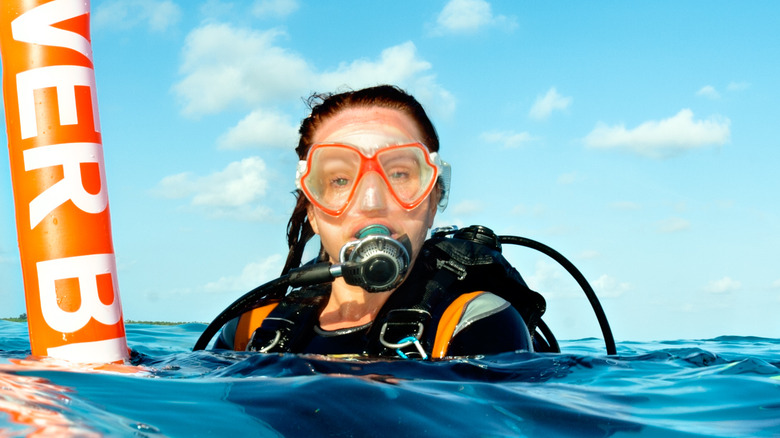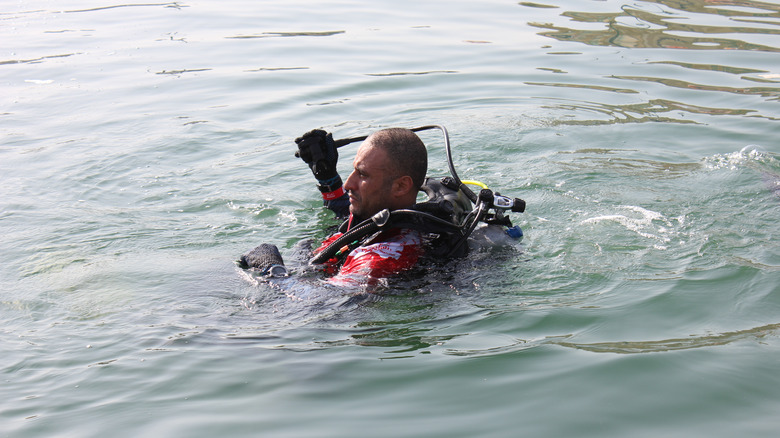How To Survive If You Get Lost At Sea While Scuba Diving
When you head offshore for a scuba diving trip, the excitement of what may be seen underwater is palpable. On the boat ride out, it is easy to imagine coming face-to-face with a variety of underwater creatures and perhaps getting that epic underwater photo. What rarely crosses divers' minds is what they should do if they are inadvertently separated from the group and lost at sea while scuba diving. While this may seem unimaginable, it does happen. Sometimes the dive boat leaves divers behind, either by accident or because they had to attend to an emergency. Other times, strong currents or heavy seas can carry divers away from the group and the boat. Additionally, if the boat capsizes, the entire group may be lost at sea.
However, getting lost at sea while scuba diving doesn't have to be a death sentence. A good example of this was in July 2024, when a couple of experienced divers were separated from the dive group about 20 miles off the Texas coast. According to Koco News 5, the pair survived 38 hours at sea before being rescued. This underscored a very real danger faced by open water divers, but it also highlighted the fact that divers are literally wearing the equipment they need to survive for extended periods of time in the open ocean — if they are aware of how to use it properly. So, before you head out for your next underwater adventure, make sure you know how to survive if you get lost at sea while scuba diving.
Stay calm, inflate your BC, and make yourself visible
Knowing what to do if you are lost at sea is critical any time you head into the open ocean, whether you are on a boat or in the water. Of course, boats are equipped with essential lifesaving equipment. However, that does you no good if the boat is gone. So, imagine popping to the surface only to see the dive boat gone or so far away you are not capable of reaching it. The first step, as is the case in any emergency, is to stay calm. Next, inflate your BC (buoyancy compensator). This will act as a life preserver, keeping you afloat. If you don't have enough compressed air left in your tank, you can use the manual inflation tube.
Next, you need to make yourself as visible as possible. It is incredibly hard to see a person bobbing on the sea, so whatever you can do to make yourself more easily seen will help. If you have an inflatable marker buoy, blow it up immediately. If you are carrying an EPIRB or other emergency locating device, activate it. If it is still daylight, attempt using a signal mirror to make your position known. As night falls, turn on your electric torch or flashlight and point it skyward. If it has an S.O.S. signaling function, utilize it.
Conserve energy, stay warm, and wait
Once you have done what you need to in order to be more visible, try to formulate a plan. Orientate yourself to the direction of the port where your trip originated. If the currents are running in that direction, you can conserve energy by riding the current. If the currents are running in another direction, scan the horizon for any structure you may be able to grasp, such as marker buoys or production platforms, as well as any flotsam that you can hoist yourself onto.
If there is nothing visible for you to grasp, remain calm, continue floating and settle in for the duration. Try to keep your eyes toward the direction of the port, as that is most likely where any rescue attempt will be coming from. But, do not attempt to swim against the current unless the shore or a solid structure is very close by. Otherwise, you will exhaust yourself without gaining much, if any, distance homeward. Whether you are wearing a wetsuit or not, it will be important to stay warm as well, especially once night falls. To help with this, you can assume the Heat Escape Lessening Posture (H.E.L.P.), which entails crossing your arms across your chest, then drawing your knees to your chest. If you are in a group, huddling together can not only help you conserve heat, but can make you more visible to potential rescuers.


